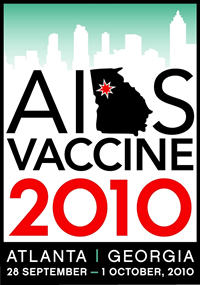 This week’s AIDS Vaccine 2010 conference, Sept. 28-Oct. 1, is underway at Atlanta’s Omni Hotel. Under the auspices of the Global HIV Vaccine Enterprise, the international meeting is hosted by the Emory Center for AIDS Research (CFAR).
This week’s AIDS Vaccine 2010 conference, Sept. 28-Oct. 1, is underway at Atlanta’s Omni Hotel. Under the auspices of the Global HIV Vaccine Enterprise, the international meeting is hosted by the Emory Center for AIDS Research (CFAR).
Over 1,100 scientists, advocates, funders, and policy makers are attending 500 sessions about scientific discoveries and future directions for developing an effective HIV/AIDS vaccine. This goal is considered critical in fighting the ongoing epidemic, which newly infects 50,000 people each week around the world.
Emory HIV/AIDS researchers are playing a significant role in the meeting. The four co-chairs are Eric Hunter, PhD, co-director of the Emory CFAR; James Curran, MD, MPH, dean of Emory’s Rollins School of Public Health and co-director of the CFAR; Carlos del Rio, MD, chair of the Hubert Department of Global Health and co-chair of the CFAR; and Harriet Robinson, PhD, formerly of Yerkes Primate Center and Emory Vaccine Center and now at GeoVax, Inc.
Hunter led the opening press conference and opening session on Tuesday afternoon.
Alan Bernstein, executive director of the Global HIV Vaccine Enterprise, emphasized the need to build a bridge between basic science and clinical research. On Wednesday, Bernstein will talk about the Enterprise’s new strategic plan for an HIV vaccine.
Dazon Dixon Diallo, director of the African-American women’s organization Sisterlove, noted that the South has been particularly hard hit by the AIDS epidemic, with over half the HIV cases in the United States. The human rights dimensions of the disease are enormous, she said, and engagement with community partners is essential in fighting HIV. Researchers need to solve the problem with the help of people who know the most about it.
Anthony Fauci, director of the National Institute of Allergy and Infectious Diseases of the NIH, said that even though the road to an HIV vaccine has been a rocky one over the past 23 years, the limited success reported last year with the RV144 trial was the first signal that it is possible for a vaccine to block HIV acquisition, a finding that has re-energized the vaccine community.
Future directions for HIV vaccine research, said Fauci, will include research that builds on insights from the success of RV144, multiple clinical trials conducted as scientific tools and not just all-or-nothing aims for vaccine licensing, more research into the early events of HIV infection that could provide targets for vaccines, and new structure-based vaccines using newly discovered neutralizing antibodies.
“I don’t think there is any question we are going to get there,” said Fauci. “The light at the end of the tunnel is the science we are now implementing.”
Press conferences are streamed live and available for playback at the conference website:
For more information on Emory’s role in the conference and Emory HIV/AIDS research, including video, see the website.


